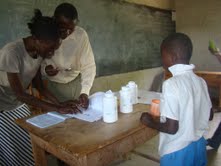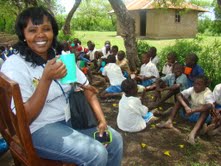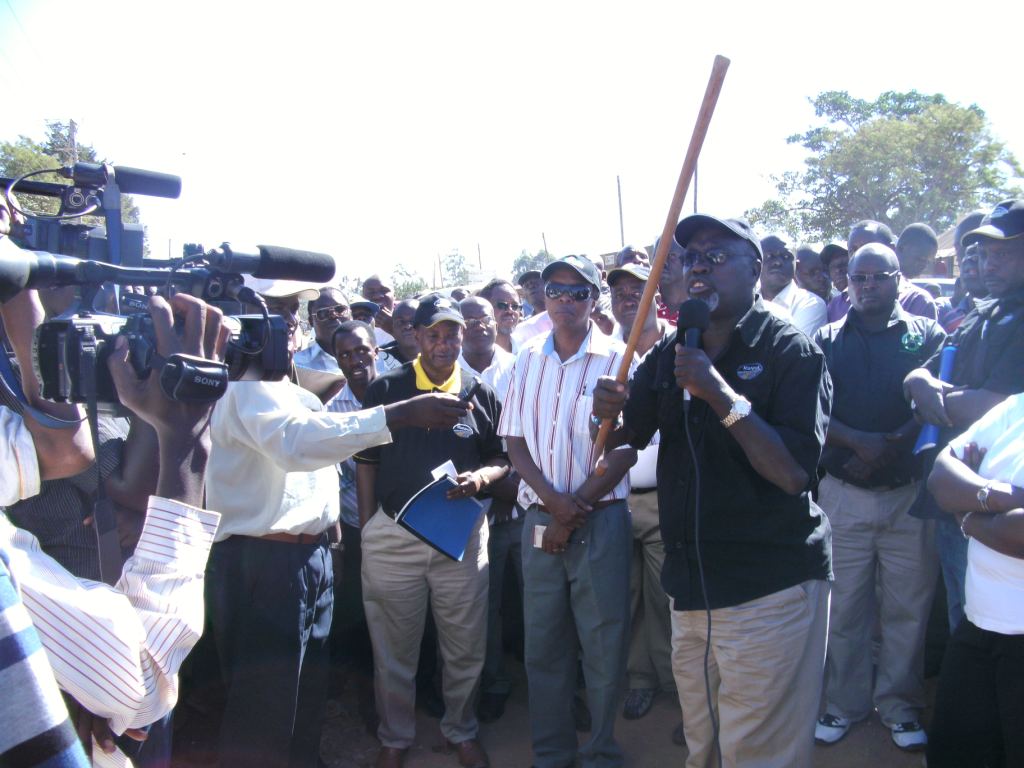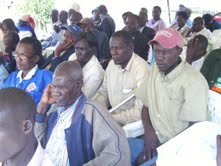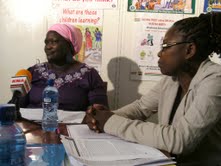By Dickens Wasonga in Kisumu.
We have celebrated Christmas, almost to the last man and soon the festive season will be over.
The sad fact however, is by the time the festive season is over 21,000 children will have died of malaria, majority of them from Africa.
Malaria still remains a killer disease with nearly 1 million people losing their lives every year. Eighty five per cent of deaths are children under 5 years of age.
Most malaria cases occur in Africa but it nevertheless remains a global problem also affecting countries in large parts of Asia and Latin America.
African Media and Malaria Research Network Chief Executive Officer, Mrs. Charity Binka from Ghana, suggests that as families get together for the festive season, it is also important that they spare a moment and reflect on malaria, a disease that can be prevented and treated, yet continues to kill unnecessarily.
The African Media and Malaria Research Network (AMMREN), an advocacy network of scientists and journalists fighting for the eradication of malaria in Africa which she heads, is using this festive occasion to urge African governments and policy makers to fulfill the various promises to allocate more resources to the prevention and control of the disease.
In Abuja, Nigeria, ten years ago, African leaders committed to halving malaria mortality for Africa’s people by 2010.
Additionally, they agreed that:
– at least 60% of those suffering from malaria have prompt access to, and are able to correctly use, affordable and appropriate treatment within 24 hours of the onset of symptoms,
– at least 60% of those at risk of malaria, particularly children under five years and pregnant women, benefit from the most suitable combination of personal and community protective measures such as insecticide treated mosquito nets.
A whole decade has passed, yet we are nowhere near achieving the targets set. In September this year, African leaders again gathered in New York under the auspices of the UN to renew their pledge to boost access to life-saving bed nets and medicines as part of the fight against malaria, aiming to reach the goal of near-zero deaths by 2015.
Indeed some countries have taken up the challenge to introduce some policies that are yielding results.
Countries like Rwanda, Eritrea, Sao Tome & Principe, and Zanzibar, have been able to bring the disease under control using existing tools.
In Sierra Leon the government has launched a nationwide distribution of mosquito nets to every single household in the country. However, many more countries need to follow the example.
But what do we see? It is business as usual for majority of African countries, as funds for malaria work continues to be the burden of development partners from Europe and America.
Another disturbing factor is the ignorance about the disease. Because the disease has been around for so long, many people take it for granted and resort to self-medication.
Clearly there is the urgent need to step up education on malaria prevention and treatment to end the needless deaths and loss of man hours that are affecting productivity.
The good news is that the existing tools for malaria prevention and treatment, such as indoor residual spraying (IRS), insecticide treated nets (ITN), and Artemisinin-based Combination Therapy (ACT), are reliable and can protect lives.
A ground breaking project, the Affordable Medicines Facility-malaria (AMFm), is now underway in Africa.
In Ghana, like many other countries in Africa, it is being implemented by the National Malaria Control Programme (NMCP).
The aim is to provide inexpensive, effective anti-malaria treatment to crowd out less effective drugs. One can now buy heavily-subsidized ACT for less than US dollar.
The world is waiting anxiously for a malaria vaccine which is expected to reduce the burden of the disease by 50%.
The RTS, S vaccine, currently being researched at 11 study sites in seven African countries, has been billed as the magic bullet to end the malaria pandemic.
In Kenya for example, clinical trials of the vaccine candidate is underway in three study sites, namely in Kilifi, at the coastal strip, and Kombewa and Siaya, both in the western part of the east African country.
The sites in Kenya target to enroll at total of 1600 children below five years as study participants for the trials, which are in the third and last phase before being adopted for routine administration if found to be effective.
What is the Kenyan situation?
Statistics from the malaria control division indicates Malaria is the leading cause of morbidity and mortality in Kenya.
According to the facts, 25 million out of a population of 34 million Kenyans are at risk of malaria.
Malaria also accounts for 30-50 per cent of all outpatient attendance and 20 per cent of all admissions to health facilities.
According to the ministry of health,an estimated 170 million working days are lost to the disease each year.
The ministry in 2006 estimated that 20 per cent of all deaths in children under five were due to malaria.
The most vulnerable group to malaria infections are pregnant women and children under 5 years of age.
The Kenyan government , In collaboration with partners, developed a 10-year National Malaria Strategy which was launched last year.
According to the minister for public health Mrs Beth Mugo, the goal of the strategy is to reduce morbidity and mortality associated with malaria by 30 per cent by 2009 and to maintain it to 2017.
She said that over the period of operationalization of the strategy, the division made key achievements in case management.
The minister noted that key to this was the successful roll-out of the new treatment policy that was launched by the country’s president Mwai Kibaki three years ago.
She said treatment guidelines and job aids were also produced and training curricula and manuals for health workers developed.
More than 12,000 health workers were also trained countrywide on case management with AL.
The same year saw five hundred new health workers recruited under the Global Fund round 4 malaria grant . These workers were formally absorbed into the public service last year, according to the minister.
”We as a ministry also made great strides towards the prevention of malaria during pregnancy.The proportion of pregnant women using insecticide treated nets rose from 4.4 percent in 2003 to 39.7 percent in 2007 while the proportion of women who received at least two doses of IPT rose from 4 percent in 2002 to 24.5 percent in 2006,in sentinel districts, and to 13 percent in all malaria endemic districts in 2007” said the minister.
Fifteen million ITN and LLIN were distributed between 2001 and 2009 in Kenya, while the use of the nets by children under 5 years rose from 4.6 percent in 2003 to 50.2 percent in 2006, after a free mass insecticide treated net distribution targeting 3.4 million children under five.
She observed that the mass distribution of ITN in 2006 corrected the inequity against the poor in ITN ownership. The current ITN ownership of 0.8 per household in Kenya is far from universal access defined as 2 nets per household.
Indoor residual spraying has been used to prevent the occurrence of malaria epidemics in the western highlands of the east African nation.
Kenya appeared to have achieved a lot although more still needs to be done. The proportion of targeted structures sprayed for instance also rose from 27.1 percent in 2005 to 63 percent in 2008.
Currently general knowledge in Kenya about malaria transmission is at 95 percent; however only 10 percent know that malaria causes anemia, neonatal and maternal death.
However, only 40 percent of service providers are able to accurately state the effects of malaria in pregnancy here.
Also in the global front,there is still some good news.
The Global Fund has just announced a 574 million US dollars pledge to fight malaria. The Bill & Melinda Gates Foundation, the US governmen,t and many other developed countries, continue to increase funding for malaria work every year. This is a clear sign of commitment to tackling the disease.
But for the African nations,it is time to show willingness to win the war against the disease because those afflicted most by malaria are largely in Sub Saharan Africa.
It must be upon them to take action to push out malaria from the continent .
Most scientists working to find solutions to see Malaria wiped out in the continent notes that the success of various malaria initiatives depend on political will, dedication of health workers, and above all, the willingness of the individual to seek prompt treatment and use the available tools to prevent or treat the disease.
AMMREN which brings African journalists and scientists across the continent together towards the fight against malaria on its part want all Africans to continue the forward march towards realization of the dream day when no man, woman or child is killed by reason of malaria in Africa.
The Network also want partners and stakeholders to keep up the pressure at this time where a lot of global effort has gone into helping Africa to deal with the scourge of malaria.
‘’The time is right and the prospects are bright, however, it is the hope of AMMREN that as we make merry and celebrate late into the night during Christmas we will sing joy to the lord and, with a unity of purpose, also keep an eye on malaria’’ said Binka.
ENDS.


